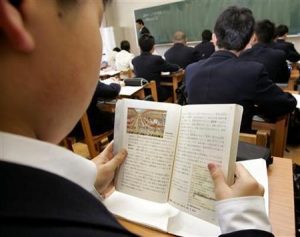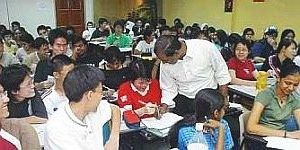Japanese History Textbook Controversies: The Missing Link
Memo #144 – History textbook controversies in Japan (教科書問題) focus on “facts” about particular events and question specific phrasing and numbers. In the past, Chinese and South Korean governments have charged that Japanese government-screened history textbooks allegedly trivialized and/or justified past atrocities.
Filipina Immigrant Girls’ Lived Experience in Japan
Memo #134 – Filipina women, who entered Japan as “entertainers” or as the spouses of Japanese men, sometimes left children behind to be raised by relatives in the Philippines while they built economically viable lives in Japan. More and more, the teenage children of these migrant women are entering Japan, entering Japanese schools, and entering society as an important and recent immigrant youth population. These youth are being reunited with their mothers, beginning lives with unknown step-families, and struggling to learn Japanese – which is often their third or fourth language. Most scholars focus on how immigrant youth are victimized by an assimilationist-oriented education system, with its Japanese-only language policies and hyper-competitive high school entrance exams. But this focus allows only a small glimpse of their lived experience.
How Finnish, not East Asian Education Became a Global Reference
Memo #132 – Finnish education has become the global symbol of educational excellence since its success in the Organization for Economic Development and Cooperation’s (OECD) Programme for International Student Assessment (PISA) implemented triennially since 2000. Every year, a few thousand international visitors, including many from East Asian nations, flock to the small Nordic nation to discover “how Finland gets it right.”
「フィンランド教育ブーム」再考
Memo #132 – 2000年以来、3年毎に実施されているOECDの国際的な学習到達度調査(以下PISA)において好成績を収めたフィンランドは、優れた教育改革のモデルとして世界中の教育関係者の注目を集めている。毎年数千人もの海外教育関係者がこの北欧の小国を訪れており、東アジアからも多くの人々がそのPISA成功の「秘訣」を探りに、「フィンランド詣で」を敢行している。
Private Tutoring in Malaysia: Regulating for Quality
Memo #126 – Private tutoring is perceived as a household necessity in Malaysia. This growing phenomenon is increasingly difficult for policy makers to ignore. The Malaysian government consistently tries to achieve a balance between encouraging and regulating private tutoring.
Menghadiri Kelas Tuisyen Swasta Di Malaysia: Pemantauan Untuk Kualiti?
Memo #126 – Dewasa kini, menghadiri kelas tuisyen swasta dianggap sebagai satu keperluan utama dalam kebanyakan keluarga di Malaysia. Fenomena tersebut yang semakin menular menyebabkan pihak berkuasa sukar untuk mengabaikan hal tersebut. Justeru, kerajaan Malaysia berusaha untuk mencapai keseimbangan antara mengalakkan kelas tuisyen dalam sektor swasta dan pada waktu yang sama memantau pengurusan mereka.
OECD’s PISA, Media Sensationalism, and Education Reform in Japan
Memo #47 – The OECD’s Programme for International Student Assessment (PISA), conducted every three years, has become a major event shaping education policy in many of the participating nations. The PISA report provides a comprehensive set of comparative data on 15 year old students’ performance, but its national rankings based on mean test scores in particular attract the most attention. Various policy actors use the rankings to affirm or scandalize ongoing education reform. The media is one of the key actors determining PISA rankings’ domestic impact, as they interpret them for the public.
OECDのPISAとメディアのセンセイショリズムが教育論争に与える影響
Memo #47 – 2000年以来3年毎に実施されている経済協力開発機構(OECD)のPISA(Programme for International Student Assessment)が、参加国の教育政策に大きな影響を与えている。この国際学力テストは、義務教育終了時点(15歳)の子どもたちの学習に関する幅広いデータを提供することを意図しているが、とりわけテストの平均値を基にした国別ランキングが注目を集めている。国内の研究者、政治家、官僚、コメンテーターらは、現行の教育政策を批判または正当化する道具としてこのランキングを用いるが、とりわけランキングに特定の解釈を与えて、それを社会一般に流布するメディアは、PISAが一国の教育政策に与える影響を大きく左右する。
Misinterpreting Globalization in the Context of Japanese Education Policy
Memo #43 – In a recent keynote address to the annual meeting of the Japan Studies Association of Canada hosted by UBC’s Centre for Japanese Research, Takehiko Kariya (Oxford University) argued that many changes in educational policy in Japan in the past fifteen years have been motivated by an understanding of globalization in terms of a knowledge economy. Policy makers were mistaken in this understanding. Instead, another impact of globalization has become more visible recently in Japan: the decline of full-time, long-term jobs. Rising inequality and lack of career opportunities rooted in a class-based distribution of learning competency, or the ability to learn, are being exacerbated rather than ameliorated by misguided educational policies.
Dr. Andrew M. Fischer Discusses Development Issues in China and Tibet
Memo #17 – In a 5-part interview, Dr. Andrew M. Fischer talks about the significance of the International Association for Tibetan Studies (IATS). He underlines that the IATS creates a unique setting where Tibetans from China, India, and abroad can meet for academic and professional discussions. When discussing the Western Development Project and Tibet-related development, he emphasizes that China has been replicating the growth model of its coastal areas in its western areas. This model of focusing on growth poles resulted in phenomenal growth in the western areas, although a result may be intensified inequalities for those who live near the poles. Tibetans are fundamentally disadvantaged by economic developments that are centred in urban areas, as those areas are controlled by outside governments, companies, and investors. Fluent Chinese speakers with outside connections benefit most from the economic conditions.



